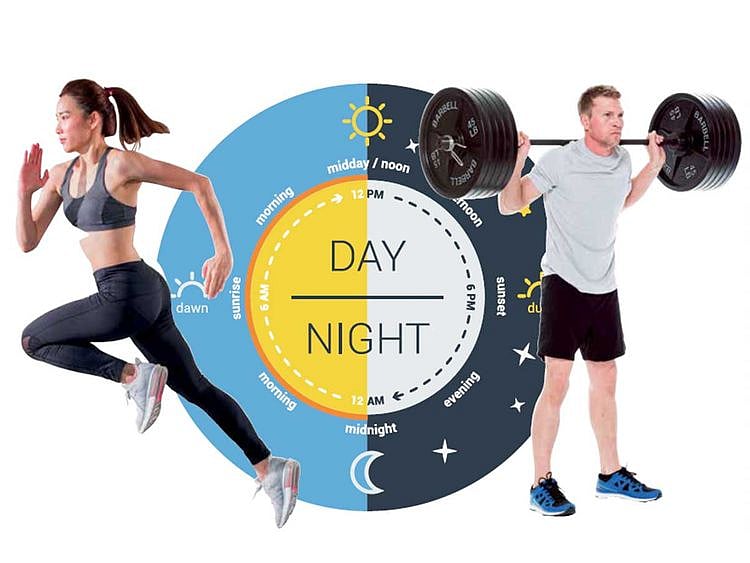Dubai: Does it make a difference at what time of the day you exercise? The debate just got more intense thanks to some recent studies that say it does. One recent paper indicates that morning exercise may activate certain genes in the muscle cells, boosting their ability to metabolise sugar and fat. While scientists say this finding requires further study, they think it ultimately might help those who are overweight or suffering from Type 2 diabetes.
An evening workout, on the other hand, say some experts, uses less oxygen, making workouts more efficient and improving athletic performance, potentially a boon for serious competitors.
“We identified that time of exercise is critical in order for exercise to be beneficial” in metabolising sugar and fat, Paolo Sassone-Corsi, director of the Center for Epigenetics and Metabolism at the University of California at Irvine said.
Sassone-Corsi believes this is controlled by a process that relies on a specific protein, HIF1-alpha, which directly regulates the body’s circadian clock, the internal mechanism that influences cycles of sleep, awakening and eating, among other things.
“Circadian rhythms dominate everything we do,” Sassone-Corsi said. “At least 50 per cent of our metabolism is circadian, and 50 per cent of the metabolites in our body oscillate based on the circadian cycle. It makes sense that exercise would be one of the things that’s affected.
“There is a time for exercise, resting or food intake,” he adds. “The metabolic cycles are not adapted to respond to external stimuli the same way at day or night.”
There are other things beyond performance and weight loss to take into account.
“Exercising late at night may interfere with sleep as it tends to energise you and enhance alertness, although some people like to exercise at the end of the day to help relieve the stresses of the day and prepare for evening activities, which is fine,” says Edward R. Laskowski, co-director of the US-based Mayo Clinic Sports Medicine and professor in the department of physical medicine and rehabilitation.
“Morning exercise has the advantage that no matter what else happens during the day, you have incorporated your physical activity. It also increases alertness and helps cognitive functioning.”
Michael Joyner, also from Mayo Clinic, who studies how humans respond to different physical stresses, including exercise, agrees.
The research “tends to suggest that morning exercising before eating is helpful in terms of ensuring or maximising some of the positives effects of exercise on metabolism,” he says. “The other positive of exercising first thing is that you get it done before the day catches up with you.”
What are your fitness goals?
Amir Sidiqqui, Owner and Founder of Symmetry Gym Dubai says, “To date, we don’t have enough data on whether [time of day] does [matter to] any significant degree,” says Siddiqui. “Personally, either early in the morning or late in the evening is best – as motivation is high in the morning, and the body is “warmed up” and ready to go hard in the evening.”
Throughout the world, says Siddiqui, afternoon siestas are common because humans instinctively have an energy slump during mid-day.
Nicole Douglas, fitness trainer, FitSquad, Dubai, says the matter of timing is deeply linked to your exercise goals. “Timing of exercise in everyday fitness comes down to your goals and routine,” she says. “Everyone has different goals. Especially in the short term, which may be to lose 10lbs, to grow your glutes, to have visible abs or to prepare for a race.
“Each of these goals will require specific methods of training and nutrition which will require focus. You may consider adjusting your workouts to align them with specific short-term goals.
“For example, fasting early morning sessions are good for fat burning or evening sessions for optimal performance, if training for a race.
“But the long-term goal is also very significant and is often the area where people go wrong. This overall goal requires discipline and routine on a continual, long-term basis.”
The key, says Douglas, is consistency and discipline. “I believe it is important to have a consistent routine. If you are an early bird, schedule your 6am sessions on Monday, Wednesday and Friday and stick to them each week. That way, it becomes part of your routine,” she says.
“It’s said it takes 28 days to form a habit. Keep it up long enough and it will become so ingrained into your lifestyle that missing a session will feel uncomfortable,” says Douglas.
(With inputs from Washington Post)
Top 10 Tips:
- Amir Siddiqui, Symmetry Gym, Dubai
Sign up for the Daily Briefing
Get the latest news and updates straight to your inbox
Network Links
GN StoreDownload our app
© Al Nisr Publishing LLC 2026. All rights reserved.
